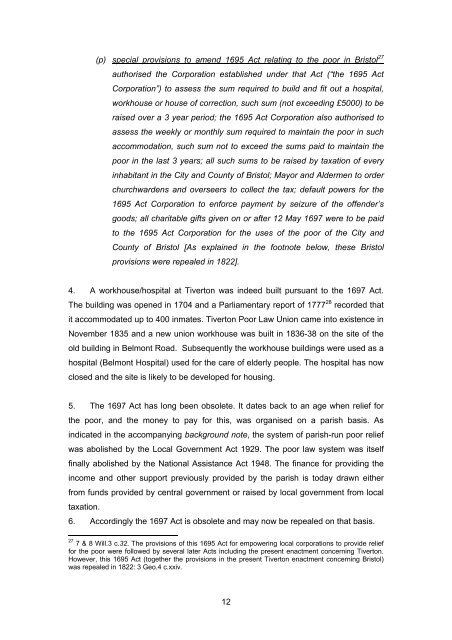Poor Relief - Law Commission
Poor Relief - Law Commission
Poor Relief - Law Commission
You also want an ePaper? Increase the reach of your titles
YUMPU automatically turns print PDFs into web optimized ePapers that Google loves.
(p) special provisions to amend 1695 Act relating to the poor in Bristol 27<br />
authorised the Corporation established under that Act (“the 1695 Act<br />
Corporation”) to assess the sum required to build and fit out a hospital,<br />
workhouse or house of correction, such sum (not exceeding £5000) to be<br />
raised over a 3 year period; the 1695 Act Corporation also authorised to<br />
assess the weekly or monthly sum required to maintain the poor in such<br />
accommodation, such sum not to exceed the sums paid to maintain the<br />
poor in the last 3 years; all such sums to be raised by taxation of every<br />
inhabitant in the City and County of Bristol; Mayor and Aldermen to order<br />
churchwardens and overseers to collect the tax; default powers for the<br />
1695 Act Corporation to enforce payment by seizure of the offender’s<br />
goods; all charitable gifts given on or after 12 May 1697 were to be paid<br />
to the 1695 Act Corporation for the uses of the poor of the City and<br />
County of Bristol [As explained in the footnote below, these Bristol<br />
provisions were repealed in 1822].<br />
4. A workhouse/hospital at Tiverton was indeed built pursuant to the 1697 Act.<br />
The building was opened in 1704 and a Parliamentary report of 1777 28 recorded that<br />
it accommodated up to 400 inmates. Tiverton <strong>Poor</strong> <strong>Law</strong> Union came into existence in<br />
November 1835 and a new union workhouse was built in 1836-38 on the site of the<br />
old building in Belmont Road. Subsequently the workhouse buildings were used as a<br />
hospital (Belmont Hospital) used for the care of elderly people. The hospital has now<br />
closed and the site is likely to be developed for housing.<br />
5. The 1697 Act has long been obsolete. It dates back to an age when relief for<br />
the poor, and the money to pay for this, was organised on a parish basis. As<br />
indicated in the accompanying background note, the system of parish-run poor relief<br />
was abolished by the Local Government Act 1929. The poor law system was itself<br />
finally abolished by the National Assistance Act 1948. The finance for providing the<br />
income and other support previously provided by the parish is today drawn either<br />
from funds provided by central government or raised by local government from local<br />
taxation.<br />
6. Accordingly the 1697 Act is obsolete and may now be repealed on that basis.<br />
27 7 & 8 Will.3 c.32. The provisions of this 1695 Act for empowering local corporations to provide relief<br />
for the poor were followed by several later Acts including the present enactment concerning Tiverton.<br />
However, this 1695 Act (together the provisions in the present Tiverton enactment concerning Bristol)<br />
was repealed in 1822: 3 Geo.4 c.xxiv.<br />
12
















